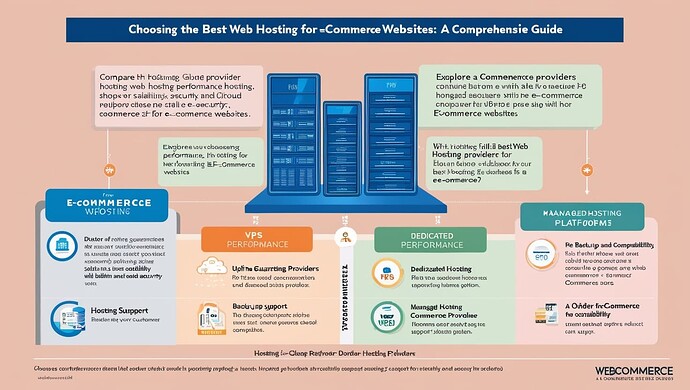Selecting the right web hosting service is crucial for the success of any e-commerce website. The performance, security, and scalability of your hosting can significantly impact user experience, search engine rankings, and ultimately, sales. Here’s a comprehensive guide to help you choose the best web hosting for your e-commerce website:
1. Understand the Importance of E-commerce Hosting
E-commerce websites have unique requirements compared to standard websites. They often handle sensitive customer data, require secure payment processing, and need to provide a seamless shopping experience to users. The right hosting solution should ensure high performance, security, reliability, and scalability to meet these demands.
2. Key Features to Look for in E-commerce Hosting
To choose the best hosting service for your e-commerce website, consider the following key features:
- Performance and Speed:
Fast loading times are crucial for e-commerce websites. Studies show that even a one-second delay in page loading can lead to a significant drop in conversion rates. Look for hosting providers that offer SSD storage, optimized server configurations, and content delivery networks (CDNs) to ensure your site loads quickly. - Scalability:
As your business grows, your hosting needs may change. Choose a hosting provider that offers scalability options, such as easy upgrades to more powerful plans or the ability to handle traffic spikes during sales events or peak shopping seasons. - Security:
Security is a top priority for e-commerce sites due to the handling of sensitive customer information. Ensure that your hosting provider offers robust security features, such as SSL certificates, DDoS protection, regular security audits, and automatic backups. Compliance with standards like PCI-DSS (Payment Card Industry Data Security Standard) is also important for handling payment information. - Reliability and Uptime:
Downtime can lead to lost sales and damage to your brand’s reputation. Look for hosting providers that offer at least 99.9% uptime guarantees and have a reputation for reliability. Check for redundancy features like failover systems and multiple data centers. - Support:
E-commerce websites require round-the-clock support to address any issues that may arise. Choose a hosting provider that offers 24/7 customer support with quick response times and multiple support channels (live chat, phone, email). - Backup and Recovery:
Regular backups are essential for e-commerce websites to protect against data loss. Ensure that the hosting provider offers automated backups and easy restoration options.
3. Types of Hosting Suitable for E-commerce Websites
Different hosting types offer various levels of performance, control, and cost. Here are the most common types suitable for e-commerce:
- Shared Hosting:
Shared hosting is the most affordable option but is often not recommended for e-commerce sites due to limited resources and potential security risks. However, it may be suitable for very small or startup e-commerce sites with low traffic and budget constraints. - VPS Hosting (Virtual Private Server):
VPS hosting offers a balanced solution with more resources and control than shared hosting. It’s a good choice for growing e-commerce websites that need better performance and security but do not yet require a dedicated server. - Dedicated Hosting:
Dedicated hosting provides an entire server exclusively for your website, offering maximum performance, control, and security. It is suitable for large e-commerce websites with high traffic and resource-intensive applications. - Cloud Hosting:
Cloud hosting is a scalable and flexible option, ideal for e-commerce sites that experience fluctuating traffic. It distributes your website across multiple servers, ensuring high availability and reliability. Cloud hosting can handle traffic spikes efficiently and offers a pay-as-you-go model. - Managed Hosting:
Managed hosting services take care of the technical aspects of hosting, such as server maintenance, security updates, and backups, allowing you to focus on running your business. Managed WordPress hosting, for example, is a popular choice for e-commerce sites built on WordPress and WooCommerce.
4. Choosing the Right Hosting Plan
When selecting a hosting plan, consider the following factors:
- Traffic and Resource Requirements:
Estimate your website’s expected traffic and choose a plan that can handle your current and future needs. Consider factors like CPU, RAM, and bandwidth. - Budget:
Hosting costs can vary widely. Determine your budget and find a plan that offers the best balance between cost and features. Remember that investing in a quality hosting provider can pay off in terms of site performance and reliability. - Technical Expertise:
Consider your technical expertise or the availability of technical support within your team. If you lack technical skills, managed hosting may be a better option to ensure your site runs smoothly. - E-commerce Platform Compatibility:
Ensure that the hosting provider supports the e-commerce platform you are using, such as Magento, WooCommerce, Shopify, or others. Look for features that optimize performance and compatibility for your specific platform.
5. Top Hosting Providers for E-commerce Websites
While there are many hosting providers to choose from, here are some popular options known for their e-commerce hosting solutions:
- SiteGround: Offers excellent speed, security features, and support tailored for e-commerce. Known for its reliable performance and ease of use.
- Bluehost: Provides a range of hosting options with 24/7 support and integration with WooCommerce for WordPress-based e-commerce sites.
- HostGator: Offers scalable cloud hosting solutions with features like integrated caching and unmetered bandwidth.
- A2 Hosting: Known for its speed and performance, A2 Hosting offers a variety of plans optimized for e-commerce platforms.
- InMotion Hosting: Provides robust security features, excellent support, and scalable hosting options suitable for growing e-commerce businesses.
